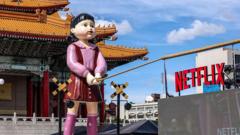Top executives from companies like Intel, Skechers, and Procter & Gamble are warning about the impact of tariffs on their profits and the broader economy, indicating increased costs and uncertainty in future forecasts.
Corporate Leaders Sound Alarm on Tariffs and Economic Consequences

Corporate Leaders Sound Alarm on Tariffs and Economic Consequences
Executives from major US companies express concerns over the adverse effects of tariffs, signaling a potential economic slowdown.
Top executives from major U.S. corporations, including Intel, Skechers, and Procter & Gamble, are increasingly vocal about the negative consequences of tariffs on their businesses and the economy at large. These companies have recently revised their profit forecasts downward or completely withdrawn them due to heightened economic uncertainty, stemming largely from U.S. trade policies.
Intel's Chief Financial Officer, David Zinsner, stated that the evolving trade landscape and the accompanying regulatory risks have raised concerns regarding a possible economic slowdown, with recession risks on the rise. He indicated that rising costs are inevitable, which resulted in a more than 5% drop in Intel's stock after these remarks.
Skechers, a prominent footwear manufacturer, echoed these sentiments, withdrawing its annual results forecast. COO David Weinberg emphasized the unpredictable nature of the current business environment, comparing it to competitors like Nike, Adidas, and Puma, who also rely heavily on Asian factories for production.
Consumer goods giant Procter & Gamble (P&G) also hinted at potential price hikes due to increased material costs from China and elsewhere. Financial chief Andre Schulten stated that the company is actively exploring ways to offset the financial burden, indicating that consumers might face price adjustments.
Additionally, Seven & I, the Japanese owner of 7-Eleven stores, expressed its struggles with tariff-related uncertainty, as North America contributes over 70% of its sales. Incoming CEO Stephen Dacus mentioned the challenges of maintaining quality while managing costs amid shifting tariff policies.
These alerts about potential economic disruption are not limited to U.S.-based companies. South Korean automaker Hyundai announced the establishment of a task force to address tariff fallout, signifying a proactive approach in adapting to trade pressures. The company anticipates ongoing challenges fueled by intense trade disputes and other macroeconomic uncertainties, with considerations to relocate some manufacturing from South Korea.
Negotiations with South Korean trade officials on tariff alleviation have seen signs of progress, hinting at a more collaborative future. U.S. Treasury Secretary Scott Bessent described a recent meeting as "very successful," suggesting that technical discussions could commence soon. The business community remains cautious as a 90-day pause on higher tariffs is nearing its expiration date on July 8.






















